Turkish presidency’s panel at UN emphasizes humanitarian diplomacy in disasters
NEW YORK
The Turkish Presidency’s Directorate of Communications hosted a panel Wednesday at UN headquarters which emphasized the significance of humanitarian diplomacy during natural disasters.
It was attended by Türkiye’s envoy to the UN Sedat Onal, Deputy Director of Communications Cagatay Ozdemir, Justice and Development (AK) Party lawmaker Ziya Altunyaldız, AFAD’s General Director of Earthquake and Risk Reduction Orhan Tatar and Presidential Security and Foreign Policy Council members Nursin Atesoglu Guney and Cagri Erhan as well as OCHA Director of Operations and Advocacy Ghada Eltahir Mudawi.
In his video message at the panel, Turkish Communications Director Fahrettin Altun highlighted the importance of fighting disinformation during disasters.
“We have to fight with international determination against disinformation, which has turned times of disaster into turmoil,” said Altun.
“In the face of this great disaster, which no country can easily be prepared for and no state can fight alone, an unprecedented state and national solidarity has been revealed,” he said.
Altun noted that the aid provided following the earthquakes by numerous international organizations, including the UN and NATO, is highly significant for Türkiye.
He said the panel at the UN underscores the value of assistance and cooperation in the face of potential natural disasters or humanitarian crises that could occur globally.
Onal, for his part, recalled that Türkiye called for emergency aid quickly, and 122 countries came to the aid of Türkiye while search and rescue teams from 90 countries were in the country to help with recovery efforts.
Onal thanked the international community for the solidarity it showed and said much more needs to be done in the coming period for recovery.
On Feb. 6, magnitude 7.7 and 7.6 earthquakes struck numerous Turkish provinces, taking over 50,000 lives.
Around 14 million people in Türkiye have been affected by the quakes as well as many others in northern Syria.




